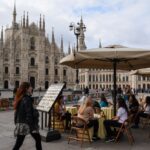
Syrian refugee kids heading back to school in Canada. Different waves of migration to the US, from the 18th century, celebrated in a citywide festival in New York. Filipinos making news as domestic workers in Hong Kong on weekdays, ultramarathon stars on weekends.
These are the uplifting tales to emerge from immigration and refugee policies in 2019.
But they are not the entire story. The major immigration events of last year were instead the crushingly inhumane separation of thousands of children from their asylum seeker parents at the US-Mexico border. The racist harassment and violence in Egypt that lie in store for sub-Saharan migrants escaping war or poverty. Right-wing nationalism growing in popularity in Europe, exploiting the influx of undocumented migrants.
In the foreword to the World Migration Report 2020, IOM director general António Vitorino reminisced about the report’s early editions – the report was first published in 2000 – which focused on specific themes such as labour mobility, migrant well-being and communication on migration.
“But, with time, there was a sense that the broader landscape and complexity of migration issues was being neglected,” he wrote.
“Times have changed, dramatically so..Migration is now a top-tier political issue interconnected to human rights, development, and geopolitics at national, regional and international levels,” he added.
While the report found “historic change at the global level” with United Nations Member States coming together to finalise two global compacts on the international manifestations of migration and displacement – the Global Compact for Safe, Orderly and Regular Migration, and the Global Compact on Refugees – the reality on the ground is far from advancing.
“The unfortunate reality is that there have been major migration and displacement events during the last two years; events that have caused great hardship and trauma as well as loss of life,” according to the report.
“Foremost have been the displacements of millions of people due to conflict (such as within and from the Syrian Arab Republic, Yemen, the Central African Republic, the Democratic Republic of the Congo and South Sudan), extreme violence (such as inflicted upon Rohingya forced to seek safety in Bangladesh) or severe economic and political instability (such as faced by millions of Venezuelans),” the report continued.
Immigration is reshaping our world as we know it. But in which direction?
In Canada, there is one university that holds the key towards education and community building that could lead to a more welcoming and inclusive world in the 2020s: Concordia University.
Its new Immigration Studies programmes delves into the politics, sociology, geography and anthropology of migration and, through community engagement, explores the practical expression of those dynamics in Quebec and Canada. It is offered as a certificate programme for professionals already working in the field or as a minor for students pursuing undergraduate studies in social sciences and the humanities.
Students in both programmes will learn three modules: Introduction to Global Migration: Theories and Issues; Immigration in Quebec and Canada; and Settlement and Integration. The Certificate programme has an additional Field Project in Immigration, Migration and Diversity.

Concordia University
Meanwhile, at the Centre for the Study of Politics and Immigration (CSPI), leading researchers like Mireille Paquet, Chedly Belkhodja and Antoine Bilodeau conduct research on the politics of immigration and on immigration-related public policies.
CPSI houses three streams focused on the interactions and intersections of politics and immigration: Immigration and Diversity Investigation Lab (IDIL), Mobilities and territories and Research Chair on the Politics of Immigration.
Concordia students benefit from a curriculum informed by this research as well as the high-profile academics leading the CSPI. Director Paquet is Concordia University’s Research Chair on the Politics of Immigration and leader of the Équipe de recherche sur l’immigration dans le Québec Actuel (ÉRIQA).
Co-director Bilodeau is the leader of the Provincial Diversity Project, a member of the steering committee for the Centre for the Study of Democratic Citizenship and a senior research affiliate with the Canadian Network for research on Terrorism, Security and Society.
Co-director Belkhodja is the Principal and Professor for the School of Community and Public Affairs as well as a Co-Investigator in the pan-Canadian Pathways to Prosperity partnership and the Migration Resilience in Urban Cities partnership.
Speaking about the new Immigration Studies offerings, Belkhodja said: “We think immigration is a very timely and important topic of our times with growing mobility debates around immigration in many societies. We think students who will be in our programs will learn a lot about policy issues and debates on immigration in Quebec and also in Canada.”
To inspire the next generation of immigration experts and advocates, the university offers a holistic approach to learning. In addition to workshops and talks, there’s also an immigration movie club and book club – i.e. interactive and impactful sessions loved by students and staff alike.
Belkhodja is the co-organiser of the immigration movie club together with postdoctoral fellow Catherine Xhardez. Among the movies screened last semester were “Ali: Fear Eats the Soul”, Rainer Werner Fassbinder’s heart-rending drama about love, racism, exclusion, guest workers, age difference.
Catherine said: “We had great moments; it was fascinating to discuss migration issues based on movies and documentaries. We were profoundly moved by the power of images and stories.”
Follow Concordia University on Facebook, Twitter, YouTube, Flickr, Instagram and LinkedIn
Liked this? Then you’ll love…
Concordia University: Smart cities and social responsibility
Concordia University: Where social justice and innovation coincide







